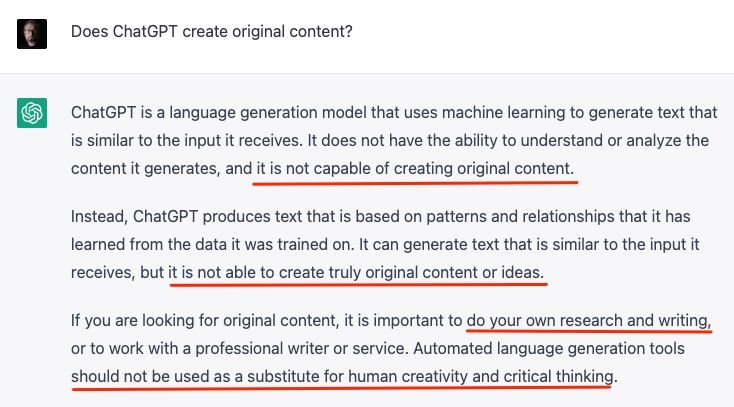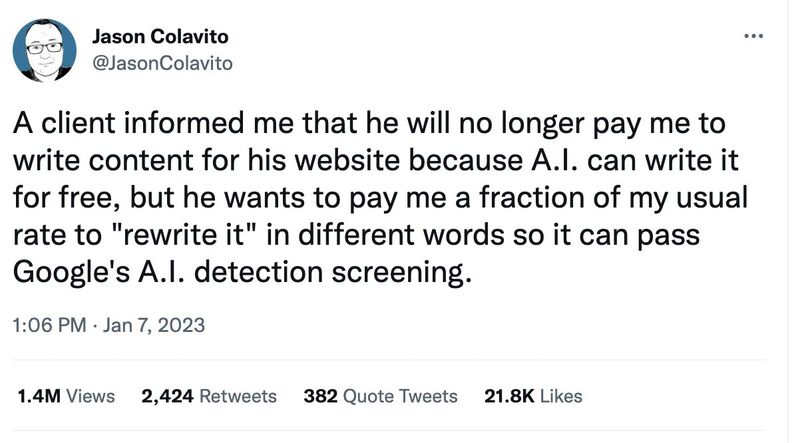If you use ChatGPT to write your blog posts then you’re turning up to a gunfight with a knife.
So no, you absolutely should not use it for this. I’ll explain why….
Don’t get me wrong, AI is incredible and I fully welcome it.
ChatGPT is great for certain things such as text completion, language translation, sentiment analysis, summarising text, and answering questions… it’s even a useful tool for a wide range of real-world applications such as chatbots and customer service.
It really is a game changer, but just not for your content strategy.
It’s no surprise that ChatGPT has garnered a lot of attention in the SEO industry. After all, it’s a chatbot that utilises natural language processing to answer questions. In fact, it may even be one of the most widely discussed AI tools to date.
When it comes to ChatGPT and SEO, I was keen to wait until the dust settled before forming an opinion.
In a short space of time, it very quickly went from just being an awesome new tool to sudden cries of “SEOs will be out of work now!”.
Which is, of course, total nonsense. In my lifetime I do not expect AI to be able to replicate human emotion or creativity.
It can mainstream some SEO tasks very well, such as keyword and content research, but it should not be used to fuel your content strategy.
Not capable
Firstly, it amazes me that so many are jumping the gun in assuming that ChatGPT is the answer to their content drought. And they do so without even asking the very tool that they place so much trust in for no apparent reason.
If you did ask it, it will tell you that it is not capable of creating original content or ideas, not to mention that it recommends you do your own research and not use it as a substitute for a human writer:

Of course, many attempts have been made to generate content – in bulk or otherwise – using ChatGPT, but the results have been less than satisfactory in terms of relevance.
While some of the content produced may have driven traffic, it failed to attract the right audience, and it did not typically generate revenue.
For most businesses, creating content in bulk using AI would be a challenge in terms of maintenance and impact, particularly without a substantial marketing team or revenue.
The cost of maintaining such content would eat into the bottom line, with little or no return on investment.
Furthermore, since generic content is often removed from the buyer’s journey, it becomes increasingly difficult to justify allocating resources towards its improvement.
Ineffective approach
Years ago, many people tried publishing thousands of posts using content mills for as low as 2 cents per word, and it proved to be an ineffective approach. This is no different.
The same is true for using ChatGPT or any other automated tool to produce content. It’s simply old-school SEO, and these strategies do not work in driving business growth.
The key to success lies in understanding what your audience needs and delivering it with authority, rather than spamming content around non-competitive, high-volume keywords.
The business acumen to recognise that AI-generated content is not the solution required to move the needle is missing.
Most businesses require high-level content that communicates expertise and addresses consumer concerns. Unfortunately, AI is not currently capable of generating such content.
No acumen
I recently came across this post on Twitter by a copywriter. It’s grim, to say the least. And the business that chose to do this? There is clearly no acumen on display by this particular client:

You could argue that most blog posts should not be for SEO, and this is true. But even those created for trust, optics and usefulness by ChatGPT will fall very short of requirements.
Content that satisfies
It is imperative to reiterate (once more) the paramount importance of creating content that aligns with Google’s expectations.
While not particularly complex, this is a facet of creating content that is frequently overlooked.
Google places a premium on content that satisfies the following criteria:
- Offers original information, reporting, research, or analysis
- Provides an extensive, exhaustive, or complete overview of the subject matter
- Offers insightful analysis or intriguing data that goes beyond the surface level
- References and cites other sources rather than simply duplicating or rehashing their content, thereby offering additional value and originality. ChatGPT, for instance, is a prime example of this approach.
- Is the kind of content that would prompt you to bookmark it, share it with others, or recommend it?
- Is similar to the calibre of content that you would find in a reputable publication, such as a magazine, encyclopedia, or book? This is an essential consideration; Google effectively prioritises journalism.
- Offers greater value than other search results pages? Trust me, ChatGPT is not expending such extensive effort solely for your benefit.
- Is crafted with care and attention to detail, avoiding any hasty or sloppy errors
- Is not mass-produced, thereby avoiding neglect and disregard for individual pages or sites.
As you can see this is not the work of AI. This is humans. It’s critical thinking, applied knowledge, originality and opinions.
I have not even yet mentioned the trust factors that Google often references. You might know it as E-E-A-T.
Authority of content
Google’s ranking algorithm considers multiple factors when determining the authority of content.
Among these factors are questions related to the author’s expertise, including whether the content provides clear sourcing, evidence of the author’s expertise or the website’s authority, and links to relevant pages such as an author page or an About page.
The algorithm also considers whether the site producing the content is well-trusted or recognised as an authority on the topic. Additionally, the algorithm evaluates whether the content is written by an expert or enthusiast who demonstrates a deep understanding of the topic.
Finally, the algorithm checks for easily verifiable factual errors in the content.
Now, do you really want to trust ChatGPT with any of this???
Not a solution
ChatGPT is a tool and NOT a solution. It can be an effective starting point.
If you have writer’s block then by all means ask it for suggestions on sub-topics – but you’d best be prepared to write about these topics in an original, thoughtful, and perhaps opinionated way.
Think about a world filled with AI-generated content. It’s a world where quality is no longer the deciding factor, where homogeneous content reigns supreme.
After all, why bother with a half-decent writer when you can just rely on ChatGPT to generate something similar? But if everyone is using the same tool, where is the differentiation?
If your competitor generates articles on the same topic using the same AI tool, how do you stand out?
The answer: you don’t.
You’re left to compete solely on backlinking and technical SEO, which are smaller pieces of the puzzle compared to content itself.
Often wrong
But even if you manage to get your AI-generated content indexed, there’s another problem: accuracy. ChatGPT may be confident in its writing, but it’s often wrong.
It’s like using predictive text on your phone – it can lead to nonsensical statements. Except with ChatGPT, the mistakes can be subtle and dangerous.
It may use insecure libraries in code snippets, or get facts wrong. And let’s not forget its inability to count words and characters properly. At the time of writing this, if you ask it for ten headlines with 50 characters or fewer, it’ll spit out ten headlines of arbitrary length, assuring you that they’re within your parameters.
Risky proposition
So, is relying on ChatGPT for SEO content generation a good idea? In short, no. Not really. The lack of differentiation and the potential for inaccuracies make it a risky proposition.
Sure, it’s an impressive tool, but it’s not a substitute for human creativity and expertise.
When ChatGPT exploded on the scene, I became very tired of reading articles only to get to the end and be told “Surprise, this was written by ChatGPT!”
This was not clever, it was obnoxious, and I could usually tell that it was written by AI anyway.
Well, I’ll just finish by saying…
Surprise, ChatGPT could NOT have possibly written this one.
Because it’s actually original and voices an opinion.
If you want to know more about how Friday can help you with SEO and content, then get in touch with us now.


